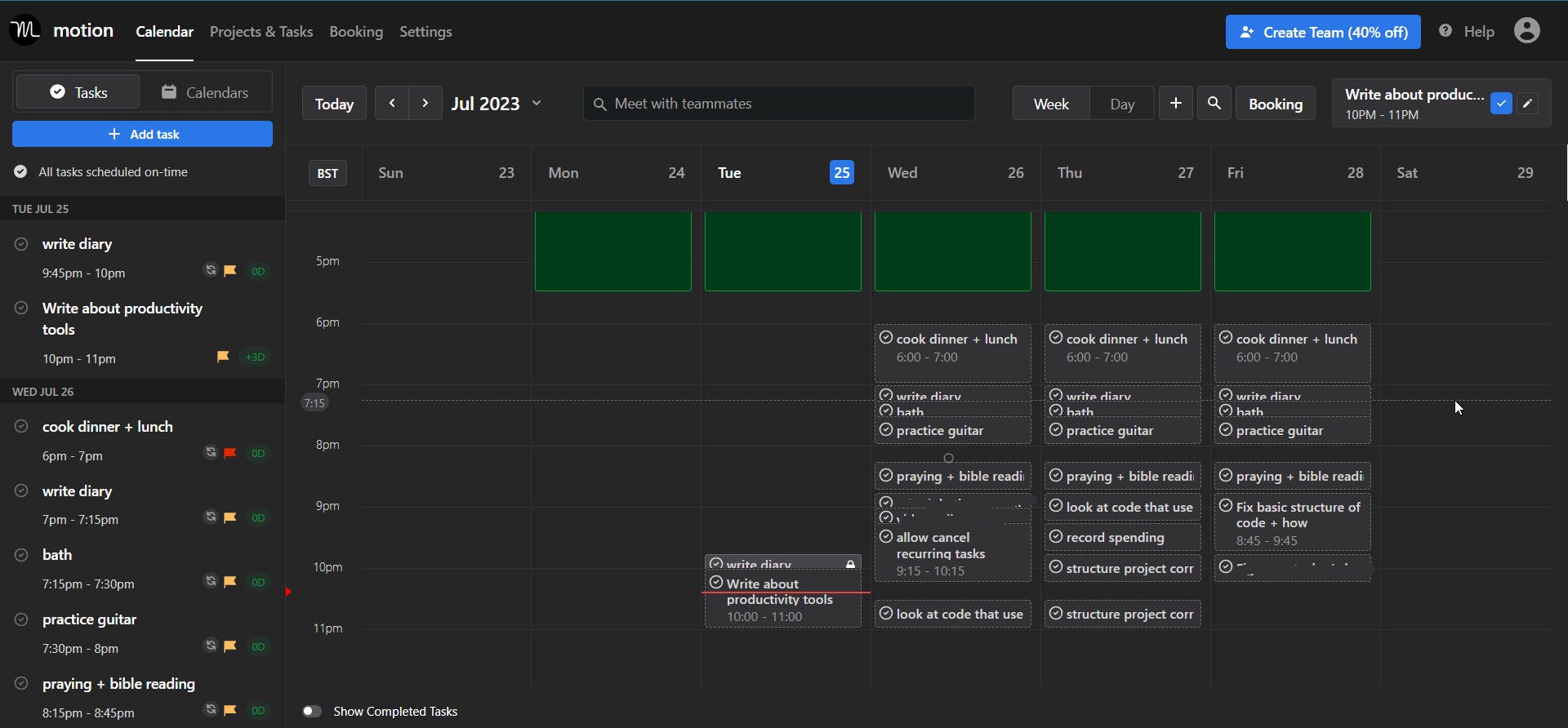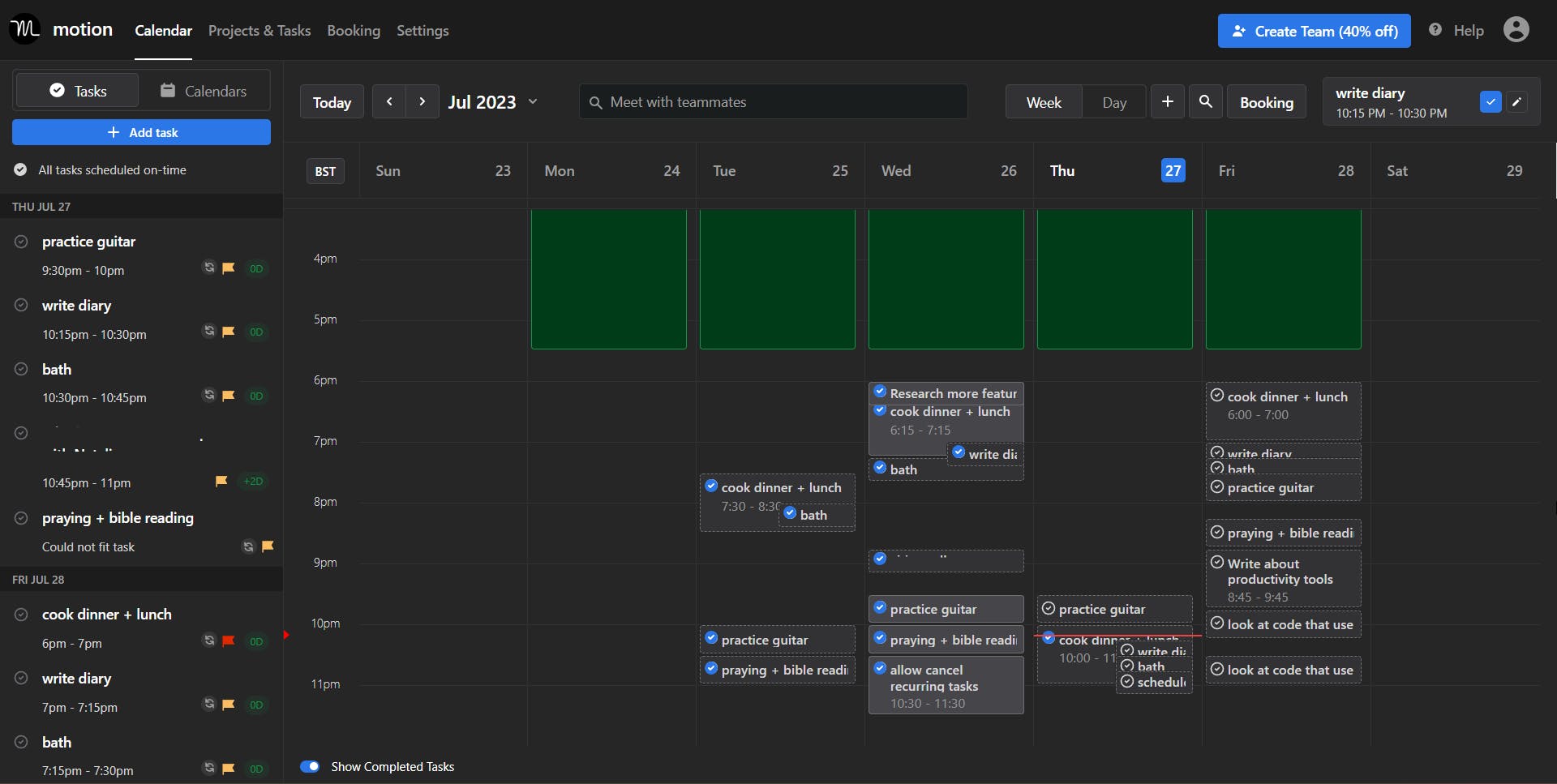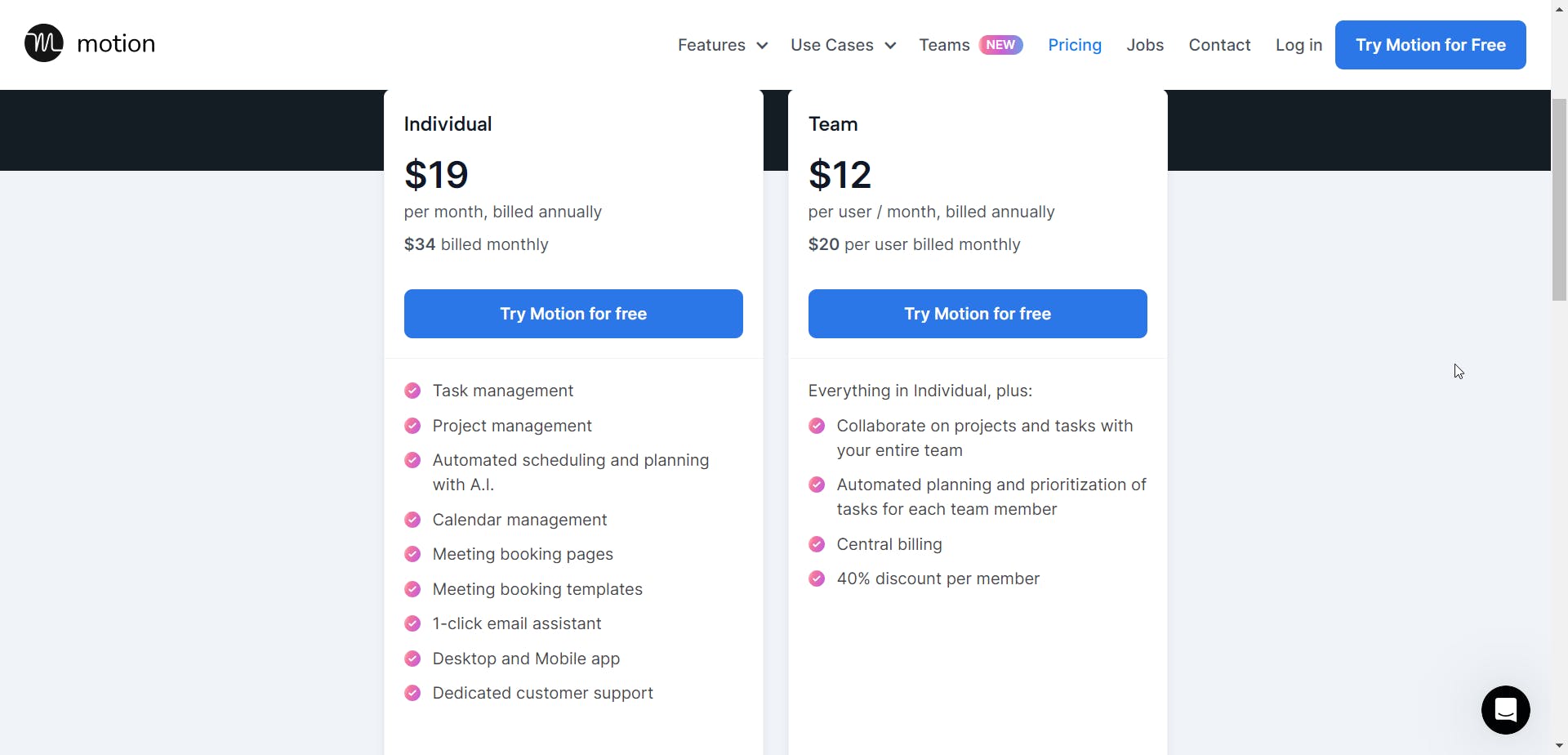Motion Review: My experience as a student in internship [week 1]
What is my experience using Motion for 1 week, based on Effectiveness, Ease of use, Customisability and Price.
Background
Hi, I'm a student currently doing a summer internship and will soon enter my final year. I'm reviewing different productivity apps to see which one can help me waste less time and have more time to work on my personal projects. This is the first week, and I'll share my experience using Motion, an AI-based productivity tool for managing tasks and schedules.

Effectiveness
Positives
Increase Awareness of time spending: Having a visible timetable and task list in front of me, and the obligation to mark tasks as complete after executing them, offered a real-time view of my accomplishments and pending tasks. This kept me aware and accountable for my day.
Seeing how little time I actually have: Once I saw the recurring tasks scheduled on my calendar, I realized how scarce my 'free' time was, making me appreciate and utilize it more consciously.

AI auto-scheduling: Letting an AI manage my schedule freed my mind from juggling 'when to do what'. This helped me concentrate more on 'what' needs to be done, enhancing my focus and effectiveness.
Automated rescheduling: If I didn't mark a task as complete, Motion would reschedule it automatically. This feature was particularly helpful when unplanned events (like a lengthy meal with friends) derailed my schedule, saving me from the tedious task of manually rearranging my calendar.
Project-based planning: The tool allows the creation of projects and their associated tasks. This made scheduling and tracking tasks related to different personal projects more straightforward.
Scheduled Breaks: Motion places breaks after every 'x' minute. This helped instil discipline in my break patterns, preventing me from extending breaks excessively.
Negatives
Not so intelligent intelligent-scheduling: While Motion claims to offer intelligent scheduling, my experience suggested a 'first come, first serve' approach. The tool would sometimes schedule routine tasks, like writing a diary or bathing, as the first activities of the day, which doesn't make sense. I had to manually rearrange these tasks.
Inefficient time segmentation: Motion mandates tasks be scheduled in multiples of 15 minutes, which doesn't always align with real-world scenarios. Some tasks may take less time, causing potential inefficiencies in the schedule.
Ease of use
Positives
Comprehensive Onboarding: Motion provides a clear and detailed introduction upon first use. It helped me understand how to set up basic functionalities, making the initial interaction smooth and enjoyable.
Robust Help Page: The help page on help.usemotion.com is well-organized and informative. It offers guidance on how to use various features, which is a great resource when you're new to the tool.
Available on multiple platforms: With a Chrome plugin and a mobile app, Motion allows users to schedule tasks on different devices according to their convenience.
Integrated with calendar: The ability to click and drag on the calendar to create fixed-time events is a significant feature. These events also sync with Google Calendar automatically, reducing the redundancy of managing multiple calendars.
Negatives
Limited mobile interactions: The inability to drag and create fixed-time tasks on the mobile app can be somewhat frustrating, especially when on the go.
Very slow startup: The loading time for the app, whether on mobile, web, or the Windows app, is notably slow, typically around 6 seconds.
Have to manually set tasks as completed: You have to manually mark a task as complete within 30 minutes of finishing it. Although this feature ensures that unfinished tasks are rescheduled, it can be a bit annoying if you're quickly moving between tasks.

Slow scheduling/rescheduling: Shifting tasks around can be sluggish, taking around 10 to 20 seconds for the system to reschedule. Even ChatGPT replies faster than this.
Inflexible schedule order: Motion offers different "schedules", which are timeframes where you do stuff. Unfortunately, it doesn't allow editing the order of them, and the work schedule always comes first, I find myself having to switch to 'life' every time I create a new task.
Bugs: I encountered a bug where completed tasks wouldn't display even when I set the preference to 'show'. Though the issue was fixed later, it was a minor annoyance.
Customisability
Positives
Definable schedules: Motion allows users to define their schedules, such as 'work' or 'life'. For example, since I use Motion for activities after work, I have set up a "life" schedule for post-work hours on weekdays and the entire duration of weekends.
Custom task timing: Tasks in Motion can have specific time frames. For instance, you might prefer to take a bath only between 8 pm and 11 pm, and Motion allows for such specific scheduling. It also lets you add preferred times for tasks, making the scheduling more personalized.
Negatives
- No colour customization: Tasks scheduled automatically by Motion cannot be colour-coded. They are all displayed in grey. The lack of colour-coding for tasks can make the calendar look monotonous and limit visual differentiation between different tasks or task categories.
Cost-Value Proposition

The pricing for Motion is $228/£178 per year or $34/£27 per month, it is definitely not cheap. Breaking down the annual cost, Motion comes to approximately 50p GBP per day. The question then becomes: does Motion provide value that exceeds or at least matches this daily cost?
If used diligently, Motion could potentially help you achieve your personal project goals. There's also a chance that these personal projects might generate income, indirectly making up for the cost of the tool. In this way, Motion can be seen as an investment in your productivity and potential success.
However, the other question is, can I achieve the same goal with another tool? there are so many productivity tools out there, and most of them are cheaper while offering functionality that isn't that far off, especially when I don't use the work-based functionality, such as meeting scheduling, kanban boards, or meeting time matches, then the cost might seem steep for the value I'm receiving. Other tools could potentially serve the same purpose as Motion for a fraction of the cost.
Experience
Using Motion has been an enlightening experience. It introduced me to many new concepts in time management. I learned about the differences between free, busy, and scheduled tasks, as well as the concept of task blockers. This newfound knowledge enabled me to better categorize my tasks and identify potential obstacles in my schedule.
The most significant impact of Motion has been on my awareness and utilization of time. With its intuitive task and time management features, Motion has encouraged me to stay on track with my tasks and commitments. As a result, I have noticed a significant reduction in time wastage.
Moreover, even if I do deviate from my schedule due to unforeseen circumstances or momentary lapses, Motion automatically reschedules my tasks. This auto-rescheduling feature prevents me from getting overwhelmed by piling tasks and helps me get back on track without any hassle.
Next week
As set out in this journey, next week I will be trialling another productivity tool: Reclaim.ai, another AI calendar that automatically plans the day for me, and see how well it does to help me rescue my time.

![Motion Review: My experience as a student in internship [week 1]](https://cdn.hashnode.com/res/hashnode/image/upload/v1690840123756/5bdf844a-d728-430c-8d9b-b88b7b77c726.png?w=1600&h=840&fit=crop&crop=entropy&auto=compress,format&format=webp)